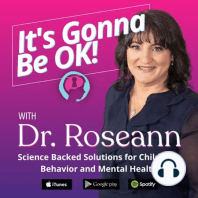4 min listen
75: ADHD and Anxiety
FromScience Backed Solutions for Children’s Behavior and Mental Health
ratings:
Length:
19 minutes
Released:
Jun 5, 2023
Format:
Podcast episode
Description
At such a young age, kids normally tend to be inattentive or unfocused but when they become consistently fearful, anxious and avoidant, worsening their lack of focus, it’s time to consult a professional to check whether these kids have a clinical diagnosis of ADHD or anxiety.These two mental health conditions often overlap significantly impacting an individual’s aspects of life. Proper diagnosis, however, is crucial to conduct the appropriate treatment. In today’s episode, we’ll be shedding light on these two mental health disorders. Anxiety and ADHD are like salt and pepper; they go hand in hand. Because most mental health disorders are multifaceted, there are conditions that overlap. For example, we can relate anxiety with ADHD, anxiety with PTSD and ADHD with PTSD. Anxiety and ADHD are two mental health conditions that can be compared to a salt and pepper duo as they go hand in hand. Typically, kids with ADHD are anxious because they’re constantly being corrected. Because of the overlap between the two, there are many cases wherein these two are often mislabeled – ADHD instead of anxiety and vice-versa. There are also cases where the two occur simultaneously. I have a podcast episode regarding this and if you haven’t checked it out yet, you should go and check it out to learn more about what’s affecting one’s attention and behavior. Through our Brain Behavior Reset Program where we get to work with people around the world, we are able to conduct brain mapping and a strategy session for purposes of brain checking. We’re able to get to the root of the problem and figure out what’s going on in the brain. The good thing about this is that I’ve had decades of experience doing this and we use quantitative data to back everything to support our neurofeedback treatment and our Brain Behavior Reset Program.What does anxiety look like?When we discuss anxiety, it’s important to take into consideration dysregulation, specifically the internalizers and externalizers. To distinguish the two, internalizers are those that you would think about anxious kids. They may come in the form of worrying too much internally. For internalizers, they have fearful and anxious thoughts that dictate their actions or inaction. They’re constantly in need of reassurance and tend to be avoidant. They withdraw from social interactions affecting their relationships with others.On the other hand, externalizers are those who display their anxiety expressly and outwardly through aggression, irritability, restlessness and the like. They often exhibit angry outbursts, verbal or physical aggression, or difficulty managing their anger and frustration.What is the crossover between anxiety and ADHD?Kids with ADHD have a hard time focusing and are easily distracted by their own inner thoughts or by their environment. They usually exhibit hyper impulsive behaviors, moving around and touching people and things. Because they have impulse control issues, they also have trouble regulating themselves and doing tasks.As for anxious kids, they often seek reassurance and validation. Because of this, they have the tendency to always strive for perfection. They also struggle with social interactions as they excessively worry about other people’s perceptions about them. One of the common denominators between ADHD kids and anxious kids is their avoidant behavior. Both individuals with anxiety and ADHD tend to avoid group dynamics. The stimulation caused by group dynamics may lead to a heightened anxiety which makes it more challenging for anxiety and ADHD kids to focus and process information. ADHD kids avoid things because they find it difficult or their brain isn’t stimulated enough to accomplish things whereas anxious kids avoid things that will trigger their anxiety or
Released:
Jun 5, 2023
Format:
Podcast episode
Titles in the series (100)
It's Gonna Be Ok! by Science Backed Solutions for Children’s Behavior and Mental Health
